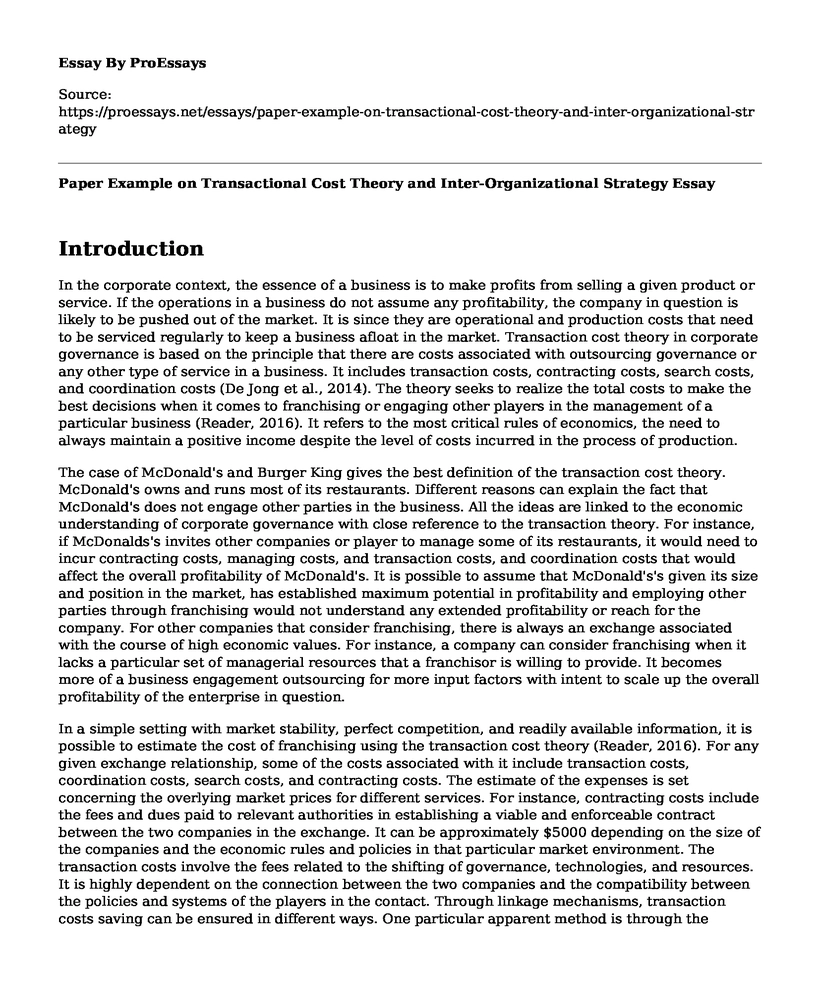Introduction
In the corporate context, the essence of a business is to make profits from selling a given product or service. If the operations in a business do not assume any profitability, the company in question is likely to be pushed out of the market. It is since they are operational and production costs that need to be serviced regularly to keep a business afloat in the market. Transaction cost theory in corporate governance is based on the principle that there are costs associated with outsourcing governance or any other type of service in a business. It includes transaction costs, contracting costs, search costs, and coordination costs (De Jong et al., 2014). The theory seeks to realize the total costs to make the best decisions when it comes to franchising or engaging other players in the management of a particular business (Reader, 2016). It refers to the most critical rules of economics, the need to always maintain a positive income despite the level of costs incurred in the process of production.
The case of McDonald's and Burger King gives the best definition of the transaction cost theory. McDonald's owns and runs most of its restaurants. Different reasons can explain the fact that McDonald's does not engage other parties in the business. All the ideas are linked to the economic understanding of corporate governance with close reference to the transaction theory. For instance, if McDonalds's invites other companies or player to manage some of its restaurants, it would need to incur contracting costs, managing costs, and transaction costs, and coordination costs that would affect the overall profitability of McDonald's. It is possible to assume that McDonald's's given its size and position in the market, has established maximum potential in profitability and employing other parties through franchising would not understand any extended profitability or reach for the company. For other companies that consider franchising, there is always an exchange associated with the course of high economic values. For instance, a company can consider franchising when it lacks a particular set of managerial resources that a franchisor is willing to provide. It becomes more of a business engagement outsourcing for more input factors with intent to scale up the overall profitability of the enterprise in question.
In a simple setting with market stability, perfect competition, and readily available information, it is possible to estimate the cost of franchising using the transaction cost theory (Reader, 2016). For any given exchange relationship, some of the costs associated with it include transaction costs, coordination costs, search costs, and contracting costs. The estimate of the expenses is set concerning the overlying market prices for different services. For instance, contracting costs include the fees and dues paid to relevant authorities in establishing a viable and enforceable contract between the two companies in the exchange. It can be approximately $5000 depending on the size of the companies and the economic rules and policies in that particular market environment. The transaction costs involve the fees related to the shifting of governance, technologies, and resources. It is highly dependent on the connection between the two companies and the compatibility between the policies and systems of the players in the contact. Through linkage mechanisms, transaction costs saving can be ensured in different ways. One particular apparent method is through the observation, identification, and adoption of standard practices and policies between the franchising companies. It helps to solve the costs associated with coordinating complicated and diverse systems. The linkage mechanism also provides a cheaper way of transacting reducing the transaction costs. It involves sharing a common platform that allows both the franchisee and franchisor ready access to critical financial information. The course reduces the overall cost of outsourcing corporate tools giving business a better chance to survive in highly competitive markets.
Conclusion
Conclusively, the corporate world is described by well-defined models and theories all aimed at creating profitability and sustainability. The transaction cost theory estimates the cost-effectiveness of employing franchising as a business strategy. It assesses the costs and the perceived benefits of the course with intent to provide a path that would be of great interest to the company in question. The case of McDonald's and Burger King is the best depiction of the transaction cost theory at play. It refers to the economic knowledge that every decision must ensure a certain degree of financial benefit so that it can keep a business in the market.
References
De Jong, Gjalt. & Nooteboom, Bart. (2014). The causal structure of long-term supply relationships: an empirical test of a generalized transaction cost theory. Springer Verlag.
Reader, C. (2016). The franchising handbook: how to choose, start & run a successful franchise. Teach Yourself.
Cite this page
Paper Example on Transactional Cost Theory and Inter-Organizational Strategy. (2022, Jun 19). Retrieved from https://proessays.net/essays/paper-example-on-transactional-cost-theory-and-inter-organizational-strategy
If you are the original author of this essay and no longer wish to have it published on the ProEssays website, please click below to request its removal:
- Taxation Theory, Practice and Laws
- Compare and Contrast Essay on Tax Avoidance vs Tax Evasion
- Illinois State Budget Analysis Paper Example
- Public Relations Campaign Project Paper Example
- Essay on Governor Introduces Budget Cuts: Evaluating Areas for Financial Cut Down
- Essay Example on US Budget: Allocating Resources to Take Care of People's Needs
- Stocks Market Behavior in the UK - Report Example







